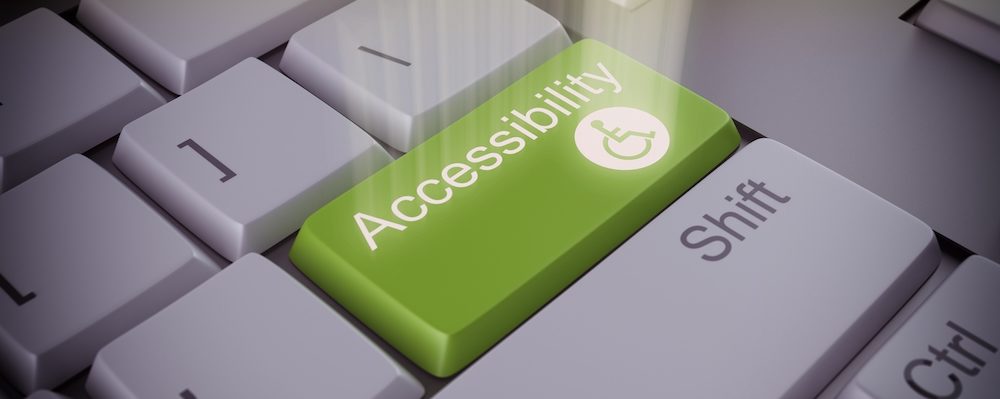Objectives
- Define power, privilege, oppression and ableism.
- Consider how privilege advantages non-disabled people.
Estimated Time
- Introduction – 5 minutes
- Review of definitions – 10 minutes
- Levels of Oppression – 10 minutes
- Instructions for game and set up – 10 minutes
- Power Bingo – 15 minutes
- Debrief of game – 5 to 15 minutes
- Closing – 5 minutes
Materials Needed
- Computer, LCD Projector, and speakers/audio connection
- Casual Ableist Language (YouTube)
- Slides:Ableism and Non-disabled Privilege Slides (PPT)
- Enough POWER Bingo Cards (PDF) for everyone to have one
- Bingo call out cards (PDF) (cut out and in a box or basket)
- Markers to cover the bingo cards – Lifesavers work well
- Accessible versions of bingo cards (You’ll need to create these)
- Non-disabled privilege handout (PDF) (to be given out after the game)
Important Considerations
The activity that accompanies this presentation will only be effective if the audience has a mix of disabled and non-disabled participants. Specifically, the cards are written assuming there are wheelchair users, people who are blind, and people who are deaf or hard of hearing among the participants. You may want to look through the cards and consider your audience before the activity. If necessary to make your point, change the cards to represent lack of privilege specifically experienced by people who will be attending.
Power Shuffle is another activity that could be done using the same statements. It requires enough space for everyone line up side by side and move forward when the statement is true for them. The proposed activity allows more people to participate at once. However, there is something visually powerful about Power Shuffle. Choose the activity that best suits your space and needs.
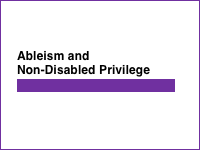
![]() [Bring up title slide]
[Bring up title slide]
![]() The focus of this presentation is on ableism and non-disabled privilege. We’re going to spend some time thinking about the definitions of several terms related to the topic and then we’ll consider how privilege impacts us individually.
The focus of this presentation is on ableism and non-disabled privilege. We’re going to spend some time thinking about the definitions of several terms related to the topic and then we’ll consider how privilege impacts us individually.
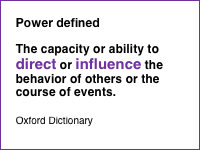
![]() [Advance to slide 2]
[Advance to slide 2]
![]()
Let’s start by thinking about “power”. Clearly, in our society, some people have more power than others. The Oxford English Dictionary defines power as “the capacity or ability to direct or influence the behavior of others or the course of events.” There are lots of ways to gain power in a society. Some ways we gain power and influence are within our control. But do they all?
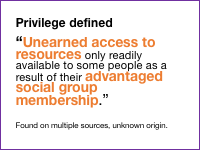
![]() [Advance to slide 3]
[Advance to slide 3]
![]()
Let’s think about that by looking at the concept of privilege. Privilege, from a sociological perspective is defined as: “Unearned access to resources only readily available to some people as a result of their advantaged social group membership.”
![]() Can you think of examples of privilege that come as a result of membership in an advantaged social group? [If the group does not have examples to share, share a few of your own examples of male privilege and white privilege.]
Can you think of examples of privilege that come as a result of membership in an advantaged social group? [If the group does not have examples to share, share a few of your own examples of male privilege and white privilege.]
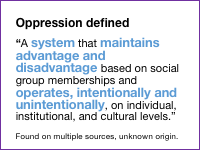
![]() [Advance to slide 4]
[Advance to slide 4]
![]()
As long as there are groups of people who experience this type of privilege, there will be others who experience oppression. Oppression is defined as: “A system that maintains advantage and disadvantage based on social group memberships and operates, intentionally and unintentionally, on individual, institutional, and cultural levels.” Let’s look at some examples of individual, institutional and cultural level oppression.
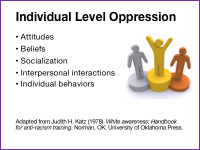
![]() [Advance to slide 5]
[Advance to slide 5]
![]()
Individual level oppression can take the form of:
- Attitudes
- Beliefs
- Socialization
- Interpersonal interactions
- Individual behaviors
Some examples of this might be: A Christian mother tells her child that it is not right for her to date people who are Jewish. An African American woman is the only person of color working on a particular unit and is not included when the women go to lunch together. A doctor tells a mother that she should not allow her child to learn ASL, that it will limit her child’s ability to speak.
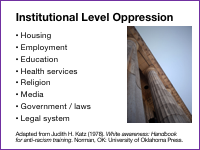
![]() [Advance to slide 6]
[Advance to slide 6]
![]()
When people with the attitudes and beliefs described above are in decision-making roles, those attitudes and beliefs can get translated into policy and practices and become institutionalized in the following areas.
- Housing
- Employment
- Education
- Health services
- Religion
- Media
- Government / laws
- Legal system
Examples include: Commercials that emphasize women’s roles as housekeepers. Discrimination by real estate companies against people of color moving into certain areas. Same sex significant others not being allowed hospital visitation rights. Schools requiring students with disabilities to deal with several levels of bureaucracy in order to get access to an education.
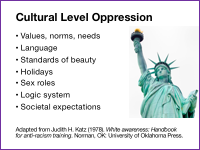
![]() [Advance to slide 7]
[Advance to slide 7]
![]()
Often these individual and institutional level oppressions are invisible to the dominant groups because this thinking is entrenched in the culture. Cultural level oppression can exist in:
- Values, norms, needs
- Language
- Standards of beauty
- Holidays
- Sex roles
- Logic system
- Societal expectations
Examples might include: Employers only giving time off for Christian holidays. Good guys wear white and bad guys wear black, thus associating whiteness with goodness and blackness with evil. Stories that associate disability with evil.
All of these levels of oppression serve to maintain the way things are and to keep people who are not a part of the dominant group at a disadvantage. Types of oppression include racism, heterosexism, sexism, religious intolerance, and ableism. Our focus from here forward will be on ableism.
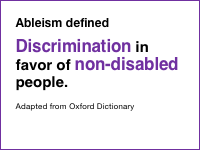
![]() [Advance to slide 8]
[Advance to slide 8]
![]()
Ableism can be defined in different ways. One definition, adapted from the Oxford Dictionary is:
Discrimination in favor of non-disabled people.
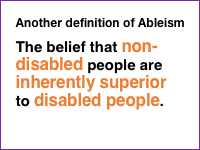
![]() [Advance to slide 9]
[Advance to slide 9]
![]() Another is:
Another is:
“The belief that non-disabled people are inherently superior to disabled people.” Let’s watch this brief video that provides examples of ableism. This is Annie Elainey, a disability activist identifies as chronically ill, disabled, queer, Latinx, woman of color and who uses her YouTube channel to educate on a variety of topics related to disability inclusion.
![]() [Show video: Casual Ableist Language]
[Show video: Casual Ableist Language]
![]() That was pretty quick. Do you have questions or reactions? What were some of the ways that Andrea mentioned that people can be ablest?
That was pretty quick. Do you have questions or reactions? What were some of the ways that Andrea mentioned that people can be ablest?
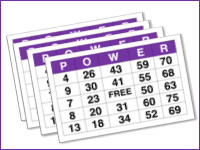
![]() Advance to slide 10
Advance to slide 10
![]()
One of the ways non-disabled people can confront ableism is to become more aware of their own privilege. I’d like for us to engage in an activity that I hope will raise some awareness of how non-disabled privilege plays out. It’s called POWER Bingo. Each of you will get a card. All of the cards are the same because we would not want anyone to start off with an unfair advantage. We know that’s how life is, right, we all start at the same place. (Wink, wink)
Now, as I read off the letters and numbers, I’ll also read a sentence. If that sentence is true for you, place a marker over that square on your card. If it is NOT true for you, leave it blank.
Let’s talk through an example.
If I enroll in a class, I can simply show up without going to an office to request access to the class.
If that is true for you, then you would cover a space with a marker. If it isn’t true for you, that is, if you WOULD have to go to an office to request access, leave it blank.
A horizontal, vertical or diagonal line of covered squares wins. If you get a line, instead of yelling BINGO, you yell out “POWER, POWER! I’ve got the POWER!”
Do I need to provide more clarifications? Are you ready? Feel free to ask questions as we go along if you are uncertain.
Play Game
![]() Debrief that game by asking these questions.
Debrief that game by asking these questions.
- Was it a surprise who won the game?
- Were there privileges those of you who are non-disabled had that you didn’t think about until today?
- If you are a person with a disability, did you notice that you have privileges in some areas and not in others?
- Did you notice statements that would represent privilege other than non-disabled privilege?
- Are there similar experiences between disability and race, for example?
- Do you want any clarification on any of the statements that were read?
- So what are the implications of this?
[If it does not come out naturally in conversation, make the point that non-disabled people can play a role in breaking down ableism by acknowledging their own privilege, providing access to things they design and events they plan, and speaking out about lack of access when they see it.]
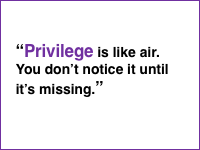
![]() Advance to slide 11
Advance to slide 11
![]() We’ll wrap this up with this quote:
We’ll wrap this up with this quote:
“Privilege is like air. You don’t notice it until it’s missing.”
Today’s activity was about taking a minute to notice that privilege and thinking about how it relates to power and oppression and specifically to ableism. I hope this will be just the beginning of your journey to consider these concepts can how you might play a role in breaking down barriers and eliminating ableism.
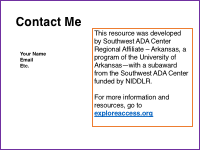
![]() Advance to slide 12
Advance to slide 12
![]() Feel free to contact me at [your information]. I’d like to thank the Southwest ADA Center Regional Affiliate of Arkansas, a program of the University of Arkansas Partners for Inclusive Communities for developing the content provided in this presentation.
Feel free to contact me at [your information]. I’d like to thank the Southwest ADA Center Regional Affiliate of Arkansas, a program of the University of Arkansas Partners for Inclusive Communities for developing the content provided in this presentation.
